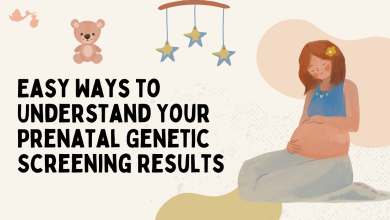Genetic Screening: Helping Moms-to-Be Feel Calm and Confident
1. Introduction
Expecting a baby is an extraordinary and emotional experience, but it often comes with its share of anxieties and concerns. One major source of worry for expectant parents is the potential for genetic or chromosomal abnormalities in their unborn child. Fortunately, advancements in genetic screening have revolutionized the way we approach prenatal care. These tests provide invaluable information that can help alleviate fears, prepare parents for the future, and ensure the health and well-being of both mother and baby.
2. Understanding Genetic Screening
Genetic screening refers to a set of medical tests that analyze the genetic makeup of the fetus and identify any potential risks for certain genetic disorders. These screenings, typically performed during the first and second trimesters of pregnancy, can detect a wide range of conditions such as Down syndrome, cystic fibrosis, and spina bifida. By identifying these risks early, parents can make informed choices about their pregnancy and future healthcare plans.
3. The History of Genetic Testing
Prenatal genetic screening has a fascinating history that spans several decades. In the past, the only options for detecting genetic abnormalities were invasive procedures like amniocentesis and chorionic villus sampling (CVS), which carried certain risks for both mother and baby. However, the advent of non-invasive prenatal testing (NIPT) in the 21st century has significantly improved safety and accuracy. The development of these new technologies has allowed expectant mothers to feel more secure and informed throughout their pregnancy journey.
4. Types of Genetic Screening
There are several types of genetic screening available to pregnant women, each designed to assess different risk factors:
- Carrier Screening: This test determines whether a parent carries a gene mutation that could be passed on to their child. It is often done before or early in pregnancy and screens for conditions like cystic fibrosis and sickle cell anemia.
- First Trimester Screening: This involves a combination of a blood test and an ultrasound to check for chromosomal abnormalities, such as Down syndrome.
- Non-Invasive Prenatal Testing (NIPT): NIPT is a simple blood test that analyzes fragments of fetal DNA circulating in the mother’s bloodstream. It is highly accurate and poses no risk to the baby.
These different screening options allow parents to choose a path that aligns with their values and healthcare needs.
5. How Genetic Screening Works
Genetic screening utilizes cutting-edge technology to provide insights into the baby’s genetic health. Blood tests analyze specific proteins, hormones, and DNA fragments in the mother’s bloodstream, while ultrasounds assess the baby’s physical development. The results from these tests are then analyzed by healthcare professionals to determine the likelihood of genetic abnormalities. Understanding the science behind these procedures can empower parents and reduce the fear of the unknown.
6. Benefits of Genetic Screening
One of the most compelling reasons for genetic screening is the peace of mind it brings to expectant mothers. Key benefits include:
- Early Detection: Knowing about potential genetic conditions in advance allows parents to prepare emotionally, financially, and logistically.
- Informed Decision-Making: Screening provides crucial information that can guide medical decisions, from delivery plans to specialized care after birth.
- Reducing Uncertainty: Many parents feel a significant reduction in anxiety once they have reliable information about their baby’s health.
7. Emotional Reassurance
Pregnancy can be a roller coaster of emotions, but genetic screening offers a sense of reassurance. For many women, waiting for the birth to confirm a baby’s health status can be stressful. Genetic testing alleviates some of this uncertainty, allowing mothers to focus on the joys of pregnancy rather than the “what-ifs.” In many cases, negative results bring immense relief, enabling parents to experience the rest of the pregnancy with reduced anxiety.
8. Genetic Screening and Family Planning
For some families, genetic screening provides crucial information that extends beyond the current pregnancy. If a genetic condition is identified, parents may choose to pursue additional genetic counseling or consider alternative family planning options. This foresight is particularly beneficial for families with a history of genetic disorders, giving them a sense of control and preparedness for the future.
9. Addressing Common Concerns
Despite the benefits, many parents still have concerns about genetic screening. Common questions include:
- Is it safe?: Most genetic screening tests, especially non-invasive ones like NIPT, are very safe for both mother and baby.
- How accurate are the results?: While no test is 100% accurate, the risk of false positives or false negatives is relatively low with modern testing methods.
- Are there ethical implications?: Genetic screening does raise ethical questions about what parents should or should not know. However, most experts agree that providing parents with more information ultimately leads to better outcomes.
By addressing these concerns openly, healthcare providers can build trust and ensure that parents feel confident in their decisions.
10. Limitations of Genetic Screening
It’s important to understand that genetic screening has its limitations. These tests do not detect every possible genetic disorder, nor can they guarantee that a baby will be free of health issues. Additionally, some conditions may only be diagnosable after birth or may not be picked up by standard prenatal tests. Being aware of these limitations helps manage expectations and fosters realistic perspectives about the outcomes of genetic screening.
11. The Role of Genetic Counseling
Genetic counselors play an essential role in helping expectant mothers interpret their screening results. They provide clear explanations, emotional support, and guidance on the next steps if a potential genetic condition is detected. By working closely with a genetic counselor, parents can feel more empowered and prepared, no matter the outcome of the test.
12. The Impact of Genetic Screening on Prenatal Care
Genetic screening has significantly influenced modern prenatal care. When potential genetic issues are identified, doctors can tailor the mother’s care plan to ensure both her and the baby’s safety. This may involve scheduling more frequent check-ups, planning for specialized birth scenarios, or arranging consultations with pediatric specialists.
13. Genetic Screening Success Stories
Numerous real-life stories illustrate the life-changing impact of genetic screening. For example, parents who discovered their baby had a genetic condition early on were able to seek specialized medical interventions, leading to better outcomes post-birth. These success stories highlight the value of genetic information and how it can lead to positive experiences, even in the face of challenging diagnoses.
14. Costs and Accessibility
One common question about genetic screening is whether it’s affordable and accessible. The cost of genetic tests can vary significantly, depending on the type and the healthcare system. In many countries, basic screening tests are covered by insurance or offered at a subsidized rate. However, advanced tests like NIPT may come with additional expenses. Advocates continue to push for broader access to these life-saving screenings.
15. Future Prospects of Genetic Screening
The field of genetic screening is constantly evolving. Emerging technologies, such as whole-genome sequencing, promise even greater insights into fetal health. As science advances, we can expect more comprehensive, affordable, and accessible screening options. The future of genetic testing is undoubtedly bright, with continuous improvements aimed at providing even more reassurance to expecting mothers.
16. The Emotional Journey of Expecting Mothers
Pregnancy, while a beautiful and transformative experience, is also filled with a roller coaster of emotions. The anticipation of meeting one’s child comes with natural concerns, many of which revolve around the health of the baby. From the moment a pregnancy is confirmed, mothers often grapple with the excitement of the future and the anxiety of the unknown. Here’s where genetic screening can serve as a vital tool, reducing some of these emotional stressors.
Hormonal Changes and Anxiety: Hormonal fluctuations during pregnancy can heighten emotional responses. Coupled with the natural protective instincts mothers develop, it’s no wonder that concerns about genetic health can feel overwhelming. By providing early and accurate information, genetic screening helps in alleviating some of this emotional turbulence. Knowing whether or not there is a significant risk allows mothers to channel their energy toward positive planning or to emotionally brace themselves and seek support if needed.
Psychological Support: In addition to genetic counseling, many women find comfort in support groups or online communities where they can share experiences and advice. Connecting with other mothers who have undergone genetic screening can help reduce feelings of isolation, reinforcing the emotional benefits that come from having a clearer understanding of the baby’s genetic profile.
17. The Science Behind NIPT (Non-Invasive Prenatal Testing)
NIPT is one of the most groundbreaking advancements in prenatal medicine. Understanding the science behind it can demystify the process and reassure mothers about its accuracy and safety.
How NIPT Works: During pregnancy, small fragments of the baby’s DNA, known as cell-free fetal DNA, circulate in the mother’s blood. NIPT analyzes these fragments to look for genetic anomalies, such as extra chromosomes that cause Down syndrome (trisomy 21), Edwards syndrome (trisomy 18), and Patau syndrome (trisomy 13). The test is highly accurate, with a detection rate of over 99% for some conditions.
When Is It Performed? NIPT can be done as early as the 10th week of pregnancy and provides results within a week or two. Its non-invasiveness means there’s no risk of miscarriage, unlike procedures like amniocentesis, making it a preferable choice for many parents.
Advancements in NIPT Technology: As technology advances, the scope of NIPT is expanding. Scientists are continually researching new markers and expanding the range of detectable conditions. This continuous improvement not only makes NIPT more comprehensive but also opens doors for earlier interventions and better health outcomes.
18. Genetic Screening for Rare Disorders
While many parents are familiar with screenings for common chromosomal abnormalities, advancements in genetic testing now allow for the detection of a growing list of rare genetic disorders. These include:
- Duchenne Muscular Dystrophy (DMD): A severe muscle-wasting disease primarily affecting boys.
- Spinal Muscular Atrophy (SMA): A genetic disorder that affects muscle strength and movement.
- Thalassemias: Blood disorders that lead to the production of abnormal hemoglobin.
Identifying these rare disorders early allows parents and healthcare professionals to plan for treatments or therapies as soon as possible, significantly impacting the child’s quality of life. Additionally, for parents who are carriers of rare genetic mutations, having this information can be crucial in planning for future pregnancies.
19. The Intersection of Genetics and Personalized Medicine
Genetic screening is paving the way for more personalized prenatal and postnatal healthcare. The idea of personalized medicine is to tailor medical treatment to the individual characteristics of each patient, and prenatal genetic testing is a fundamental part of this revolution.
Customized Prenatal Care Plans: If genetic screening reveals a higher risk of a specific condition, healthcare providers can create a more tailored prenatal care plan. This might include more frequent ultrasounds, specific dietary recommendations, or the involvement of specialists, such as pediatric cardiologists, well before birth. Knowing what to expect allows parents to feel more empowered and in control of their pregnancy.
Future of Personalized Pediatrics: As genetic screening becomes more advanced, there’s the exciting possibility of newborns receiving healthcare recommendations based on their unique genetic profile. This could include diet, activity levels, and even the likelihood of developing specific conditions later in life.
20. Ethical Considerations in Genetic Screening
With great power comes great responsibility, and genetic screening is no exception. The ability to predict potential genetic disorders in unborn children raises several ethical questions, such as:
- Privacy Concerns: Who has the right to know about the results of genetic tests? This question is critical when considering the potential for discrimination based on genetic information, whether by insurance companies or employers.
- The Decision to Continue or Terminate Pregnancy: Genetic screening results may present parents with difficult decisions. For some, a diagnosis of a serious genetic condition may influence whether they choose to continue with the pregnancy. The debate surrounding the ethical implications of this choice is complex and often influenced by cultural, religious, and personal beliefs.
- Psychological Impact: Knowing that a child may be born with a genetic condition can weigh heavily on parents, sometimes leading to heightened anxiety or feelings of guilt. The ethical responsibility of healthcare providers is to offer not only information but also compassionate support and counseling.
21. What Genetic Screening Cannot Do
While genetic screening is a powerful tool, it’s important to recognize its limitations. There are conditions that these tests cannot detect, including:
- Environmental Factors: Genetic tests can’t predict health conditions that may arise from environmental factors, such as maternal diet, exposure to toxins, or stress levels during pregnancy.
- Late-Onset Genetic Disorders: Conditions that develop later in life, like Huntington’s disease or certain types of cancer, are not typically screened for in prenatal tests.
- Multifactorial Conditions: Disorders influenced by a combination of genetic and environmental factors, such as autism or congenital heart defects, often remain undetectable in prenatal screenings.
Understanding these limitations helps parents manage their expectations and reminds them that while genetic screening is informative, it’s not all-knowing.
22. The Role of Partners in Genetic Screening
Partners also play a vital role in the genetic screening process. While much of the testing focuses on the expectant mother, it’s important to consider the genetic contributions of the father. Carrier testing for genetic mutations, for example, often involves both parents, especially if there’s a family history of genetic disorders.
Emotional and Practical Support: Partners are instrumental in providing emotional support and helping to navigate the decisions that follow genetic screening results. Open communication between partners about the expectations, fears, and hopes surrounding the pregnancy can strengthen the bond and make the screening process less daunting.
23. Addressing Misconceptions About Genetic Screening
There are several misconceptions about genetic screening that can deter expectant mothers from considering these tests. Let’s debunk some of these myths:
- “Genetic Screening Always Leads to Invasive Testing”: This is false. Most genetic screening methods, like NIPT, are non-invasive and only a small percentage of pregnancies require follow-up invasive tests.
- “A Positive Screening Result Means the Baby Will Have a Disorder”: Screening tests only indicate a risk level, not a definitive diagnosis. Further diagnostic tests are needed to confirm any condition.
- “Genetic Screening Is Only for High-Risk Pregnancies”: While genetic screening is often recommended for mothers over the age of 35 or those with a family history of genetic disorders, it is available and beneficial to all pregnant women.
Understanding these facts can help parents make more informed decisions about their prenatal care.
24. The Societal Impact of Genetic Screening
On a broader scale, genetic screening has significant implications for society. As more people gain access to genetic information, there’s the potential for both positive and negative societal outcomes.
Public Health Benefits: On the positive side, genetic screening can lead to better health outcomes at a population level by reducing the incidence of preventable genetic conditions. This has the potential to reduce healthcare costs and improve the quality of life for affected families.
Concerns About Genetic Discrimination: There’s also the concern that genetic information could be used to discriminate against individuals. For instance, insurance companies might charge higher premiums to parents with a genetic predisposition to certain conditions. In response, many countries have implemented laws to protect against genetic discrimination.
25. Future Research and Innovation in Genetic Screening
The future of genetic screening holds incredible promise. Researchers are exploring ways to make genetic tests more comprehensive, affordable, and accessible to all pregnant women. Emerging technologies like CRISPR (a gene-editing tool) may even pave the way for correcting genetic abnormalities in utero.
The Role of AI and Machine Learning: Artificial intelligence is also being used to improve the analysis of genetic data, making it faster and more accurate. With the integration of AI, doctors will be able to provide even more precise risk assessments and predictions.
Conclusion
Genetic screening has revolutionized the field of prenatal care, offering expectant mothers the opportunity to learn about their baby’s health early in the pregnancy. While it may not be a magic solution to every genetic concern, it does provide invaluable peace of mind, allowing parents to prepare emotionally and practically for the journey ahead. As science continues to advance, the future of genetic testing holds even more promise, providing greater clarity and support to families around the world.






